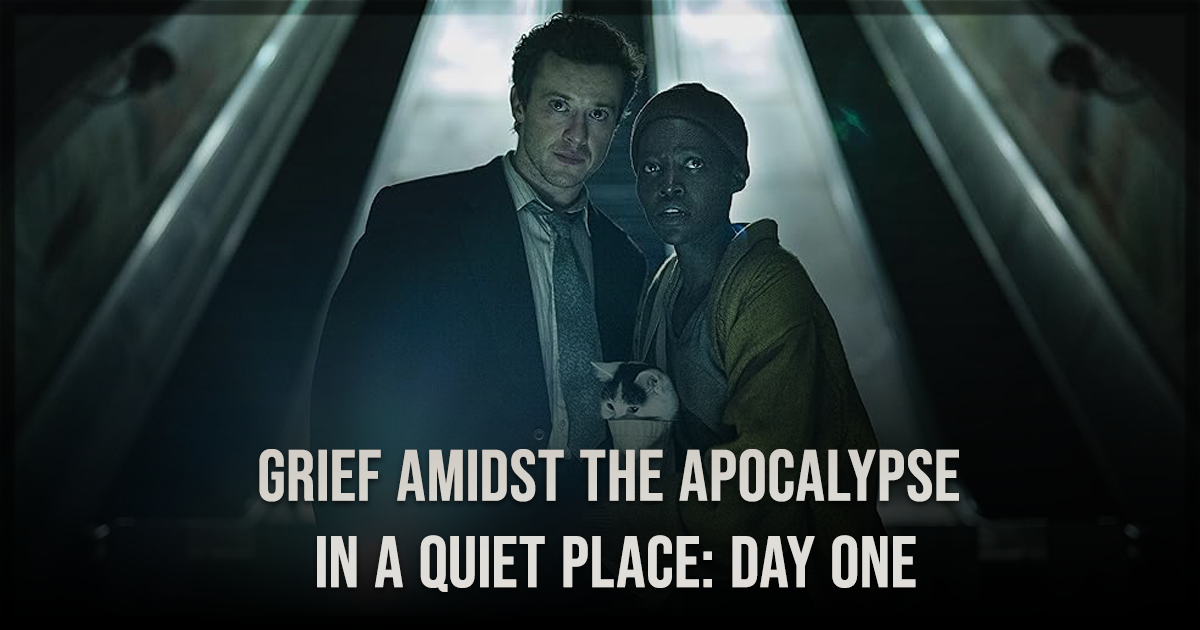It may be unrealistic to suggest that zombies will rise from graves or aliens will flood the sky, but a lot of films and TV shows, like War of the Worlds and The Walking Dead, provide an insight into what might happen in those situations. They beg the question: what would you do in the face of an apocalypse? Would you gather with your family and friends and try to survive, or hope that the government might intervene and be your saving grace, or would you reminisce on a life well lived and simply give up?
The A Quiet Place universe has been taking the world by storm since the first film dropped in theaters in 2018. The films have grossed almost $900 million dollars worldwide, and have received critical acclaim. They are set in a post-apocalyptic world where the Earth has been invaded by cryptid-style aliens – who have been given the moniker “Death Angels” by fans – with a super acute sense of hearing. Basically, you make a noise and you’re dead. A Quiet Place and A Quiet Place Part II, both directed by John Krasinksi, are set over a year after the initial invasion so there was always a question mark on how the invasion began. The latest film in the series, A Quiet Place: Day One directed by Michael Sarnoski, aims to rectify that.
Although A Quiet Place: Day One was pretty well received upon release, garnering a nice 86% on Rotten Tomatoes as of August 2024, it has drifted out of the cultural conversation pretty quickly. It certainly hasn’t had the staying power of the first film in the series. You could attribute it to a plethora of reasons, but mainly people writing it off as another surface level generic action movie. Below the surface, however, A Quiet Place: Day One has something to say about the human condition that resonated with me after recent events in my own life.
The story within the story for A Quiet Place: Day One
Set in New York City on the first day of the invasion, prequel A Quiet Place: Day One, follows Samira (Lupita Nyong’o) as she tries to help Eric (Joseph Quinn) to find a way to get off the island of Manhattan and away from the threat of terrifying creatures from out of the sky that have the supersonic sense of hearing. Sam isn’t trying to get off the island like Eric for a reason though, as Sarnoski reveals that she is terminally ill, so she doesn’t see the point in surviving. This doesn’t stop her from having her own goal within the narrative: to get a slice of pizza from her favorite pizza spot.
As A Quiet Place: Day One progresses, we learn that Sam had lost her father a few years before the invasion, and the reason she wanted to go to her favorite pizza spot is that it’s where her father used to take her. Losing a parent is a life-altering experience, one I have now experienced myself as my Mum recently passed away. Loss changes the make-up of your reality in ways you’ll never be prepared for.
Although it’s only been a matter of months for me, as opposed to years for Sam in the film, I related heavily to the idea that finding these minute connections to your loved one is incredibly important in keeping their memory alive. Doing things that remind you of them is a way of bringing them back to life, albeit not literally. These moments are hard but comforting, so it is easy to see why Sam would want to achieve this goal, especially in the face of death from multiple angles: cancer and killer aliens.
This movie’s unexpected and thought-provoking offering
This is where the best scene of the film comes in. Fairly close to the final action crescendo of the film. Sam discusses with Eric that she used to watch her Dad perform at a jazz bar and then get pizza with him afterward. To help Sam feel better, Eric decides to orchestrate a trip to this jazz bar, and even goes to a shop close by to grab a pizza. He then proceeds to act out a close-up card trick, inviting Sam onto the stage to be his volunteer, all in complete silence as you’d expect. Eric’s gesture allows Sam to process her grief and reminisce about happier times with her dad.
This scene bowled me over when I watched it in the cinema. We’re talking full-on guttural sob. As I was watching it, I started to apply it to my relationship with my Mum and it immediately got me thinking about what I would do in Sam’s situation. Clambering to the nearest supermarket to find a scratch card, bringing it back home, and scratching it off together to see if we’ve won the jackpot. My own way of bringing my Mum back to life, if just for a second.
Up until this point, A Quiet Place: Day One lays firmly within the borders of a sci-fi action film, with Sam and Eric in various precarious situations where people are being ripped apart around them. But this scene is different; it doesn’t last long, but it completely transcends the borders that had been set out in the previous 75 minutes. A very ordinary and real experience injected into a film that depicts the extraordinary. After all, what one person might see as a generic action movie might be an emotionally charged experience for someone else. Such is the magic of film.
All of this is to say that the sky could literally be raining aliens, but it is the connections we make throughout our lives that give us strength. Eric’s gesture allowed Sam a chance to experience a time when her father was alive. You can tell how much of a balm that was to her; the understandable pessimism fades away because of the joy those memories hold for her. So this scene and A Quiet Place: Day One have become a comforting cog, rotating in the machine of my grief. It’s taught me that even though the person you love might be gone, they never truly are. You just have to look in the right places.
A Quiet Place: Day One is now available on digital and demand.
Learn more about the film, including how to watch it, at the Paramount website.
You might also like…
‘Tata’ Documentary Review – A Highly Emotional Work of Forgiveness (TIFF)


